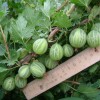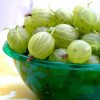Ural besshipny gooseberry: varieties, cultivation features
Peculiarities
Of course, breeders have not yet managed to develop varieties that are completely devoid of thorns. Gardeners continue to argue about the flavor characteristics of the thornless varieties. Many are sure that their berries are sweeter than those of other types of their favorite culture. Experts believe that the taste of the fruit directly depends on the characteristics of each of the many varieties.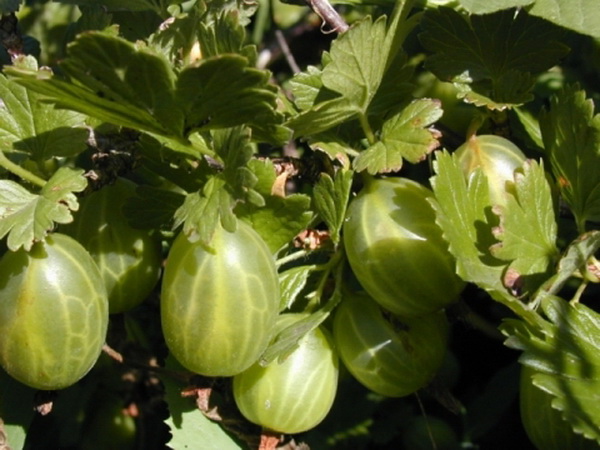
As for the description of the Ural thornless gooseberry bush, its shrubs have an average degree of density, are vigorous and medium spreading. The branches usually grow vertically. Shoots are also of medium thickness and grayish yellow. Single buds of light brown color with a sharp tip appear on them. The foliage description is as follows. It is green in color, has no pubescence on the surface, wrinkled and rather leathery. The sheets are somewhat wavy and trilobate. The petiole is about 2 cm long. In this best of the thornless varieties, you can see flowers about 12 mm in size. The buds are usually painted in a beautiful crimson hue.
Large berries appear on the bush, each of which weighs about 8 grams. If we talk about the description, then they have an oval shape, matte surface and are emerald green. Covered with a dense skin. The pulp of the Ural gooseberry, which belongs to the thornless varieties, is endowed with a pleasant dessert taste.
The peculiarities of this type of culture include the rich chemical composition of the fruit. It includes dry substances in an amount of 12.8%, sugars - about 9.9%, P-active substances - 234.0 mg per 100 grams, ascorbic acid - 23.5 mg per 100 grams, titratable acidity is 2, 1 %. Also, the advantages of this one of the best varieties of rose hips are considered to be excellent winter hardiness (even in severe winters, its indicator is 2 points), large-fruited, excellent taste of berries, resistance to various diseases, high yield - by the age of 5 years it is capable of reaching 5, 5 kg and up to 7 - 9 from each adult plant.  The beginning of fruiting of the Ural shrub variety should be expected as early as 2 - 3 years from the moment of planting. The purpose of the fruits of such a culture is universal. They are equally good when eaten fresh and for preparing various preparations for the winter.
The beginning of fruiting of the Ural shrub variety should be expected as early as 2 - 3 years from the moment of planting. The purpose of the fruits of such a culture is universal. They are equally good when eaten fresh and for preparing various preparations for the winter.
Video "Description"
From the video you will learn a description of the gooseberry varieties.
Landing
The planting of new bushes of the Ural rose hips, as well as the Chelyabinsk, and many other thornless varieties, begins in late September - mid-October. 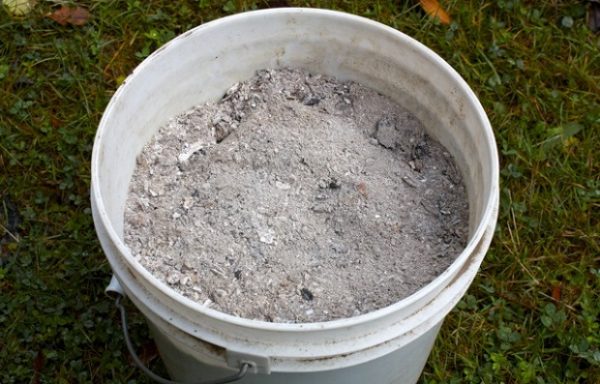 For a seedling, they dig a hole measuring 40 by 40 by 40 cm. It is recommended to pour 1 kg of complex mineral fertilizer, 1 bucket of rotted manure, 2 - 3 tablespoons of wood ash there. This composition must be mixed well. After falling asleep, a seedling is also placed in the hole.
For a seedling, they dig a hole measuring 40 by 40 by 40 cm. It is recommended to pour 1 kg of complex mineral fertilizer, 1 bucket of rotted manure, 2 - 3 tablespoons of wood ash there. This composition must be mixed well. After falling asleep, a seedling is also placed in the hole.
Mulching is carried out a day after planting seedlings and watering. This procedure is very important because it allows you to keep a sufficient amount of moisture in the soil and reduce the amount of weeding.Peat or pine bark is well suited for creating mulch. If the planting procedure was carried out correctly, then fertilization will not be required in the first year of the shrub's life. In the second year, a mixture of manure and water should be applied in the spring in a ratio of 1: 8. In the third year, you will need to apply top dressing made from 6 kg of manure, half a glass of wood ash and 20 grams of superphosphate per square meter of soil.  Further, the frequency of top dressing is 1 time in 2 - 3 years. It is considered mandatory to apply fertilizer with a high nitrogen content to the soil, which will help plants to fully grow and develop. Such dressing is applied after all the snow on the site has melted.
Further, the frequency of top dressing is 1 time in 2 - 3 years. It is considered mandatory to apply fertilizer with a high nitrogen content to the soil, which will help plants to fully grow and develop. Such dressing is applied after all the snow on the site has melted.
Care rules
Regardless of the varieties, all types of thornless gooseberries do not require much maintenance. As for the rest, compliance with certain rules for our variety will guarantee its normal growth and a rich harvest of delicious berries in the future. The complex care includes a weeding and loosening procedure. Watering on especially hot days and in the absence of natural precipitation is carried out at the rate of 1 bucket for each bush. 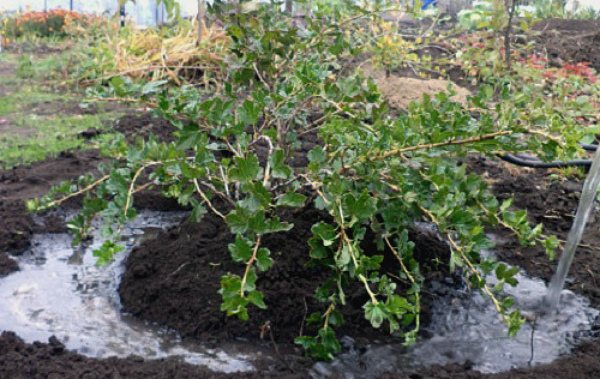 This is if the crops were planted recently. For those who are already consistently bearing fruit, 3-4 buckets are required for each bush. Shortly before the start of harvesting, watering must be stopped. If this is not done, the berries are likely to become sour.
This is if the crops were planted recently. For those who are already consistently bearing fruit, 3-4 buckets are required for each bush. Shortly before the start of harvesting, watering must be stopped. If this is not done, the berries are likely to become sour.
Formative pruning allows you to get a rich harvest of your favorite berries. It should be carried out the next year after planting. To do this, you need to cut out zero shoots, leaving no more than 5 pieces of the most developed ones.
As practice shows, most of the fruits can be harvested from 4-6-year-old branches. Old, sick, drying out, small branches are subject to mandatory pruning. Normally, an adult representative of the species should have about 10 - 14 branches, different in age, but not older than 7 years. This will serve as the key to good fruiting.
When the shrub is 10 years old, it needs anti-aging pruning. It is advised to plan it at the end of autumn.
In the process of carrying out work, all branches are subject to removal, with the exception of young shoots. In order to increase the frost resistance of the variety, it is customary to add phosphorus-potassium fertilizers to the soil in the fall. In the case of proper care, any bush gains the ability to produce crops for up to 30 - 40 years. Remember that gooseberries are endowed with excellent anti-inflammatory, anti-sclerotic and tonic properties.
Video "Growing"
From the video you will learn how to properly grow gooseberries to get a good harvest.

